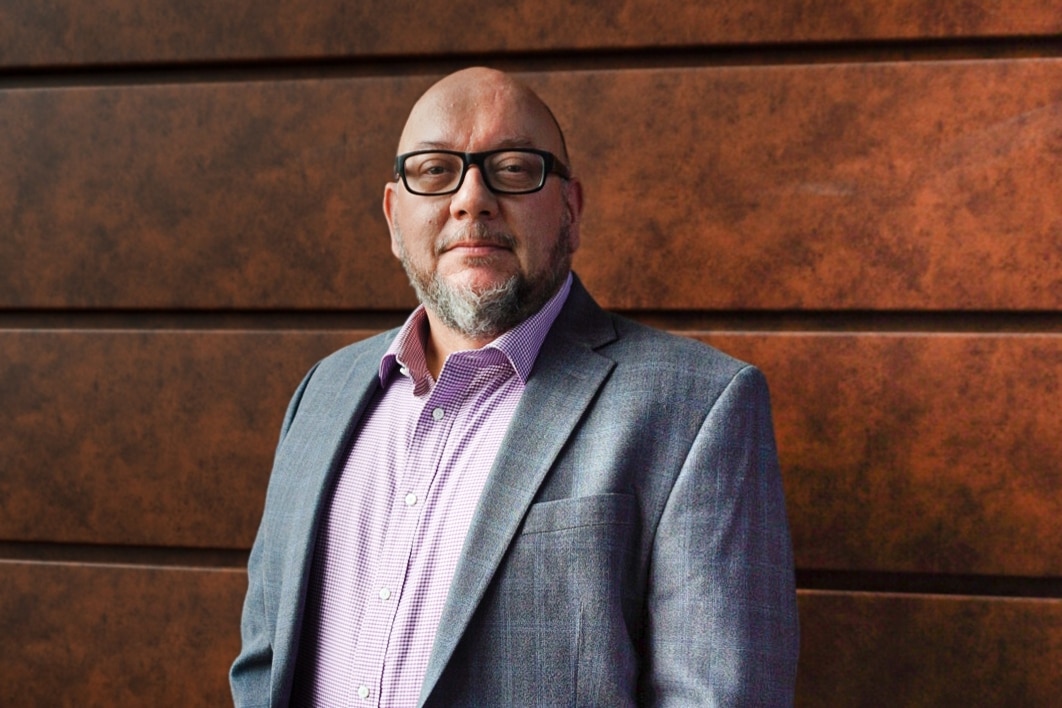Faculty Feature: Dr. Chris Koenig-Woodyard: Bringing thoughtfulness and passion to gothic literature
Dr. Koenig-Woodyard talks about being open to change, connecting with students, and how staying up-to-date with trends informs his teaching.
When I first began my studies at the University of Toronto Mississauga (UTM), a family friend told me that I simply could not miss out on taking a class with Dr. Chris Koenig-Woodyard. I took her advice and enrolled in his second-year British literature class (ENG203); then I signed up for his class on the Brontë sisters (ENG315), in my third year. When I saw that he would be teaching a fourth-year seminar focusing on “Monsters and Monstrosity” (ENG473), I built my schedule to accommodate taking it—I was not missing out on this course, even if it meant having a full day of classes with no breaks in between.
While many may associate English classes with Shakespeare, too many readings, and sheer boredom, Dr. Koenig-Woodyard’s classes breathe new life into the experience of being an English major. In his 20 years of teaching in the Department of English and Drama at UTM, Dr. Koenig-Woodyard has covered a vast array of topics, including monsters, Lady Gaga, Dungeons and Dragons, Jane Austen, and Stranger Things, with some of his primary focuses being gothic literature and monster studies. His passion for gothic and romantic literature began during his undergraduate studies, when he encountered the unfinished Samuel Taylor Coleridge poem, Christabel.
“[Christabel is] a very strange, unusual, mysterious poem. It’s not finished, so the plot doesn’t resolve, and as a reader, you’re left with all these open-ended questions, and so it teaches you how to think about ambiguity and obscurity. It doesn’t give you canned answers,” he shares. Dr. Koenig-Woodyard soon learned that gothic literature, as a genre, is filled with mystery and suspense; because of how ambiguous it can be, the genre asks you to investigate loose ends and think critically. “It might seem like critical thinking is really far away from gothic horror stories, but critical thinking is really about being able to take massive amounts of information that aren’t sorted, [that] don’t make sense trying to organize them, [and] trying to figure them out,” he explains.
After receiving an Honours Bachelor of Arts from Wilfred Laurier University, and a Master of Arts from the University of Western Ontario, Dr. Koenig-Woodyard made his way to Oxford. In England, he took research classes and studied bibliography (book history). “I thought I would write books,” Dr. Koenig-Woodyard says, reflecting on his time earning a Master of Studies and a Doctor of Philosophy. “I was in English, but I totally thought I was going to spend my life in libraries,” he admits.
After graduation, Dr. Koenig-Woodyard travelled back to Canada and began to teach—a process which he says was, and continues to be, a “perpetual apprenticeship.” Despite having self-doubts about his teaching skills early on, Dr. Koenig-Woodyard fell in love with the profession. He began to take classes in public speaking, assignment design, and course construction. Even today, he continues to read and write about pedagogy and teaching.
“I went to universities—sometimes they were very big universities—but they had very small classes and the professors were really committed professionally and personally to what was happening in the class,” says Dr. Koenig-Woodyard. “So, there was a tremendous amount of support, and I realized it wasn’t just academic support [and] support for assignments—that they were there to teach the whole person and not just a student,” he explains, emphasizing the importance of getting to know his students and learning about their individual educational journeys.
These lessons translate directly into his classrooms, where Dr. Koenig-Woodyard is known both for his “pedagogy of care,” and his ability to weave past with present, drawing comparisons between classic novels like Jane Eyre and more current film franchises like Twilight (2008). His classes reflect the varying nature of English literature, while demonstrating his willingness to modify his course content to match current trends, and even the interests of his students.
“It’s hard to stay on top of new music, new movies, and new TV shows and video games. So, I read widely. I read a lot of reviews of TV shows, movies, [and] video games, [focusing on] the ones that seem to be talked about the most, or just catch my interest,” shares Dr. Koenig-Woodyard. This is how courses like ENG383: Lord Byron and Lady Gaga: Celebrity, Persona and Genre were born. “I don’t always have everything figured out and I allow for the possibility of brand-new things that excite me and scare me a little bit [because] I don’t always know exactly how to do them,” he says, “You just have to be open.”
While he loves building courses and teaching material that he’s passionate about, Dr. Koenig-Woodyard reveals that he places an equal amount of importance on his time with his students. “It’s an absolute privilege to spend a lifetime with students who are figuring out and finding ideas, politics, making friends, figuring out opinions about the world,” Dr. Koenig-Woodyard says. “There’s so much energy and electricity in spending your life around people [during] this formative experience, and U of T students are the best students in the world,” he finishes.
Managing Editor (Volume 49); Senior Copy Editor (July–November, Volume 49); Copy Editor (Volume 48) — Juliana is a fourth-year student completing a double major in English and Professional Writing and Communication. She previously worked as a Copy Editor for Volume 48 and briefly as Senior Copy Editor for Volume 49. When she isn’t adding commas or splitting up run-on sentences, Juliana loves to read, play violin, sing, fangirl over multiple TV shows, and completely spoil her two dogs.


